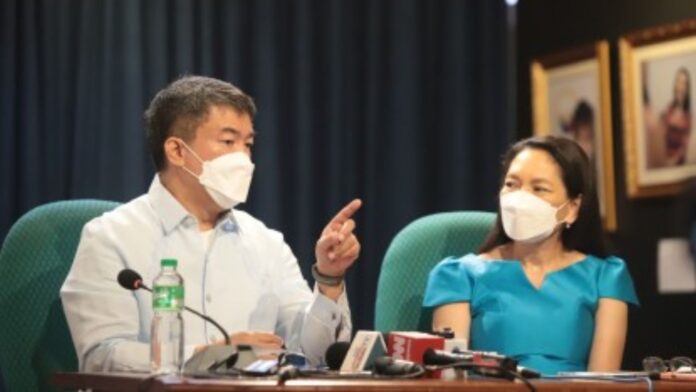The Senate minority bloc announced on Monday that it will formally move to convene the Senate as an impeachment court before the 19th Congress adjourns, saying the chamber must fulfill its constitutional duty amid continued delays in the trial of Vice President Sara Duterte.
In a press briefing, Senate Deputy Minority Leader Risa Hontiveros said she and Senate Minority Leader Aquilino “Koko” Pimentel III will initiate the formal opening rites of the impeachment trial on the Senate floor later this afternoon.
“We in the Senate Minority will formally move to commence the opening rites in the impeachment trial of Vice President Sara Duterte. We will move to allow Senate President Francis Escudero to take his oath as presiding officer and to administer the oath to all members of the Senate as judges,” Hontiveros said.
She clarified that the move is not to begin the trial proper but to fulfill the constitutional sequence of steps: first, the Senate President takes his oath as presiding officer; second, all senators are sworn in as judges; and third, the Articles of Impeachment —transmitted by the House in February— are read aloud in plenary.
“Wala pa tayo sa trial proper. Opening rites pa lamang. Panunumpa at pormalidad. Hindi ito aabutin ng isang oras (We’re not yet at the trial proper. These are just the opening rites —oaths and formalities. It won’t even take an hour),” Hontiveros said.
She explained that while it has been a practice for House prosecutors to read the articles, the Senate Rules on Impeachment allow any authorized Senate official, such as the secretary acting as clerk of court, to read them once the chamber is convened.
The senator argued that the Constitution does not require a majority vote to begin these rites.
“Ayon sa mismong Konstitusyon, hindi kailangan yung approval ng majority para lang simulan ang aming tungkulin sa impeachment process (According to the Constitution itself, the approval of the majority is not required just to begin our duty in the impeachment process),” she added.
Still, should it come to a motion, Hontiveros said they will not hesitate to file one on the floor.
“Ideally, the Senate President will simply approve our motion. That alone should suffice under the Constitution,” she said.
Hontiveros lamented that the opening rites should have been held immediately upon the House’s transmittal of the articles, as mandated.
“Upon receipt of the Articles of Impeachment, forthwith —it should have happened. But since we’re now down to the wire, we will proceed with the motion today,” she added.
Asked why the minority did not push the motion earlier, Hontiveros responded: “Ideally, no motion was needed. But now, with just three session days left, we’re taking the extraordinary step.”
She pushed back against views that the plenary has discretion to delay or deny the move.
“Most powerful is not the Senate, not the House, not even the President —but the Constitution,” she said, adding that impeachment proceedings are a non-legislative function that the Senate must obey, separate from its legislative discretion.
Hontiveros said that if Senate President Escudero decides to put the motion to a vote, the minority is confident it now has growing support among majority senators.
She cited Senators Alan Peter Cayetano, Joseph Victor “JV” Ejercito, Sherwin Gatchalian, and Senate President Pro Tempore Jinggoy Estrada as among those who have expressed support.
The senator also raised concerns about suggestions within the chamber that the impeachment case might be dismissed outright —an option she insisted is neither found in the Constitution nor the Rules on Impeachment.
Hontiveros dismissed proposals to conclude the trial by June 30 as premature.
She said the minority does not yet have a proposed timeline, as even the opening rites have not been allowed to proceed.
The senator added that impeachment is a grave constitutional duty, not a rushed process.
Hontiveros called for fairness for both parties — House prosecutors and the defense — and urged the Senate to uphold justice and accountability.
Once convened, she said, the impeachment court can begin to discuss the trial’s timetable and determine how to proceed during the remaining session days or in the 20th Congress, if necessary. (PNA)


